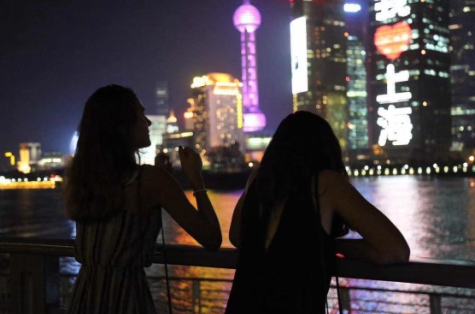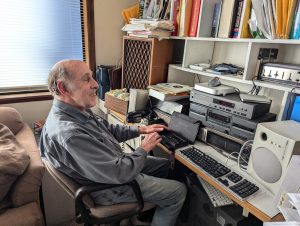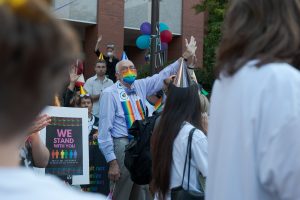Foreigner in her own land
Being a third-culture kid at SPU
February 17, 2022

I am a third-culture kid.
A third-culture kid is a person who is born into one culture but is raised in a different one. I was born in America, but I was raised in China from age 8-14. My family moved because my dad had a job opportunity open up in Shanghai and my parents felt that they were being called to live internationally. Transitioning back to my home culture after being away was a unique challenge because, although I might not look like a foreigner, I have been absent from my home culture for years.

When people look at me, they see a white, American girl who is from Los Angeles and now goes to school in Seattle. None of that is incorrect, yet it leaves out the biggest, dearest parts of me. I can blend in. My speech, clothes and demeanor all support this identity. I know a lot of pop-culture references and I can share stories about nostalgic TV shows or music.
What people don’t know is that I watched Good Luck Charlie from a pirated DVD sitting on the couch of my 19th-floor apartment in Shanghai. What people don’t know is that I listened to most early 2000s pop music via “QQ Music” which is a free music app popular in China. What people don’t know is that I’ve been to an international school, homeschool co-ops and bilingual schools, but up until my freshman year of high school I had never attended public school in America.
While I could relate and even contribute to the conversations with my peers, I felt alone. Here I am completely ‘normal’ on the outside, yet am full of memories and experiences no one around me shares.
I have moved nine times in my life. The weight of moving that much did not hit until my most recent move to Seattle for college. I was envious of my new college friends that have grown up in the same city or home their entire lives. My feelings of being a foreigner in my own country have never been this strong.
I thought that talking about my time in China would help combat this feeling of loneliness. Yes and no. While some people meet me with kind questions and genuine interest, I have also been met with rude or racist comments about China or even a glazed overwhelmed look that shows that they don’t know what box to put me in and that they don’t even want to do the work to understand my experience.
Over winter break, I grieved this feeling of displacement and bewilderment. I unpacked the fact that there were layers to my pain, as there always is. Because it wasn’t just that I didn’t get to have a stable idea of what home was, but it was the fact that I have transferred school so many times that my engagement with hobbies and extracurriculars are far from what is viewed as normal in America. For instance, I have never played a sport because the opportunity never arose in China. Playing sports seems to me like a huge part of American childhood that I missed out on. It was also the fact that I’ve moved so many times and lived so far from family that my relationships are not the same as my peers.
I have a few friends I met in China that I consider best friends, but in terms of when I entered into high school, I knew no one. When I go home for breaks it is a little lonely because I do not have friends that I have known my whole life or grown up alongside. My closest friends live thousands of miles away.
To put it bluntly, my social capital, in the American sense, is weak. Nothing about me is traditional and here I found myself in college with the most traditionally American friend group I had ever had – ‘traditional’ in the sense that they all had lived in one place their whole lives and engaged in white American culture. In high school, most of my friends were people of color. I think because we could all understand the experience of having multicultural lives. I want to be clear that since I am white I engage a lot with white American culture, but have this third-culture experience blended in with it.
As all of this became apparent to me, I felt the need to process my international childhood. I now know that I value diverse friendships because it ministers to the third-culture side of me. As I move forward I am going to try to be more intentional about cultivating diverse friendships so that I don’t have to feel so alienated here at SPU. I plan to check out the clubs for international students and spend more time with the few people I know who have lived internationally.
If you are a fellow TCK, an international student or someone who has moved around a lot, know that you are not alone. I think it’s therapeutic to have friendships that acknowledge all sides of a person. To spend time fretting over the things we wish happened or the things we cannot change points us backward and not forwards. Everyone’s experience is unique and we all have something to contribute. Instead of viewing experiences as what separates us, try looking at them as the areas where we have something of value to contribute that is desperately needed.


























































































Selia • Mar 1, 2022 at 7:31 am
Haley, thank you so much for your honesty. You are not alone. My children have also struggled with their identity. They are Hispanic and that’s what people see due to their skin color, hair color and last name. They were born and raised in Washington. They don’t speak Spanish. They don’t share the same common religion (Catholic), food, or traditions. They had white friends growing up, attended a Protestant church, and weren’t raised with traditional meals like Posole, menudo, mole, albondigas, because I never learned how to make those meals.
My children are proud to be Hispanic and love the culture, but are slapped in the face, often, by rude, judgy people who tell them that they are not Mexican enough or American enough.
I think making friends with diverse ethnicities is a great way to feel normal.
God Bless You and all of students at SPU.
Haley Blain • Mar 2, 2022 at 11:48 am
Thank you for taking the time to read this. I hope your children continue to be proud of their culture and unashamed of their experience.
Caroline Sato • Feb 19, 2022 at 10:21 am
Haley this is great! Thank you for writing it down and putting words to the tough emotions that go with your experience. I’m sending this to Daniel and Lucy; we’ve talked a lot about the high price you pay for really being a member of two or three cultures, and for your bilingualism. Great gifts… and the pain is real. Love you!
Haley Blain • Mar 2, 2022 at 11:47 am
Thank you! I hope they feel validated after reading it.
Sandy Lee Schaupp • Feb 19, 2022 at 8:54 am
Loved reading this Haley. Thank you for writing it. I hope it leads to other TCK finding you and other students to understand you better. Love you!
Sandy Schaupp
Haley Blain • Mar 2, 2022 at 11:45 am
Thank you!
Sage • Feb 17, 2022 at 8:49 pm
I love that you shared you story. It really is important to stay open minded.
Haley Blain • Feb 19, 2022 at 11:54 am
Thanks Sage 🙂